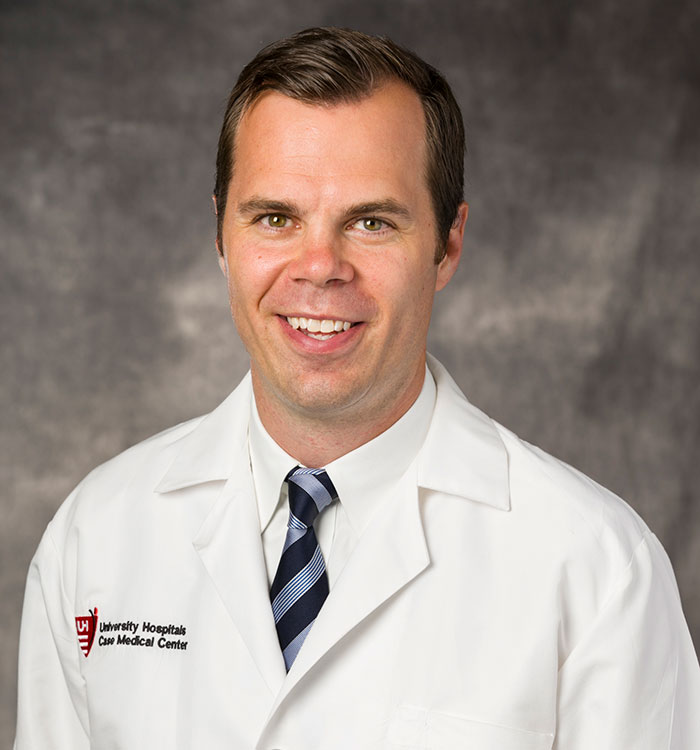Data-Driven Stem Cell Therapy
August 30, 2018
UH Sports Medicine Institute leads the way in regenerative medicine
Innovations in Orthopaedics - Fall 2018
 James Voos, MD
James Voos, MDStem cells act as the body's internal repair system, dividing in unlimited quantity to replenish other cells. Their regenerative properties have made them a focal point of research for treatment of heart disease, stroke, spinal cord injury, diabetes and osteoarthritis, among other diseases.
University Hospitals Sports Medicine Institute is one of the few U.S. institutions to obtain FDA approval to multiply and grow stem cells for arthritis treatment. The study has set UH on a path to become a national leader in musculoskeletal regenerative medicine.
Institute Medical Director James Voos, MD, Head Team Physician, The Cleveland Browns; Chairman, Department of Orthopaedic Surgery, Division Chief, Sports Medicine, UH Cleveland Medical Center, Medical Director, UH Sports Medicine Institute, University Hospitals; Associate Professor, Orthopaedics, Case Western Reserve University School of Medicine, is recruiting patients this year for phase I of a pilot study on the “use of autologous expanded mesenchymal stem cells (MSC) for the treatment of early arthritis and focal chondral defects of the knee.”
The study brings together experts from UH's Sports Medicine and University Hospitals Seidman Cancer Center. “This study is a perfect example of how two specialties can share science and develop new techniques to take care of people,” says Dr. Voos, who also serves as Chairman of University Hospitals Cleveland Medical Center Department of Orthopedic Surgery.
ABOUT THE STUDY
The study evaluates the safety and tolerability of an autologous bone marrow-derived MSC in patients with early arthritis. Patients undergo a bone marrow harvest; researchers then isolate and expand the MSCs obtained from the harvest procedure. Patients return for MSC injections after two to three weeks. Patients will be followed clinically for two years.
“We isolate and identify the best of those stem cells,” says Dr. Voos. “We then multiply those cells in the lab so you have an army of stem cells. It's a novel approach."”
Stem cell therapy has received a lot of attention recently as a game-changer for sports injury treatment; however, the FDA has not deemed most these therapies as safe and effective.
Dr. Voos and team chose to work with the FDA and uphold its rigorous standards. “As an academic medical center, it's our obligation,” he says. “We acknowledge that regenerative medicine and stem cell therapy have capacity for the future. If we're going to use stem cells, we will deliver them in a manner that's undergone scientific scrutiny. We have the research capacity, the structure and the scientists that can study this in a manner to best inform and care for our patients.”
WHY STEM CELLS FOR ARTHRITIS?
Osteoarthritis is the most common joint disorder in the United States, affecting more than 30 million people – and counting. “With the number of osteoarthritis patients growing, the need for joint replacements is growing so fast we can barely keep up with demand,” Dr. Voos says. “As orthopaedic surgeons, we want to help people live an active life as long as possible. If we can intervene early, we have the potential to reduce the risk or eliminate the need for future knee replacement.”
ADVANCING REGENERATIVE MEDICINE
The stem cell study is only the beginning for UH’s developing regenerative medicine program. Its primary goals include:
- Conduct basic science and clinical research on site in collaboration with stem cell experts in the National Center for Regenerative Medicine.
- Develop and share technology and techniques required for soft tissue restoration.
- Perform regenerative procedures and monitor and evaluate outcomes over time.
To accomplish this, UH plans to raise $2 million to fund the stem cell study and to recruit and set up a lab for a national expert in musculoskeletal tissue engineering.
By advancing regenerative medicine, Dr. Voos sees broader potential for its therapies to assist in fracture healing, ACL reconstruction, rotator cuff repair and trauma.
“If this study is successful,” he says, “it has the potential to benefit all orthopaedic applications.”
Resources: Impact of Mesenchymal Stem Cells in Knee Osteoarthritis, https://clinicaltrials.gov/ct2/show/NCT03477942.
For more information on the UH Sports Medicine Institute's regenerative medicine program, or to refer patients to the clinical trial, contact Dr. James Voos at 216-844-3055.


